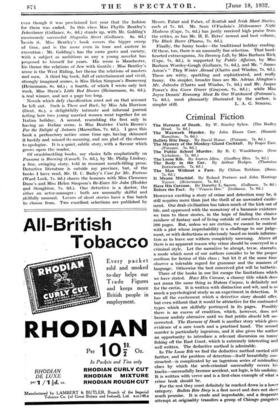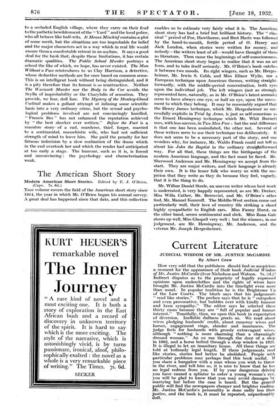Criminal Fiction
Bullets Bite Deep. By David Hume. (Putnam. 7s. 6d.)
HOWEVER exciting a story of crime and detection may be, it still requires more than just the thrill of an unwonted excite- ment. Our drab civilization has taken much of the kick out of life, and oppressed with the monotony of a banausic existence we turn to these stories, in the hope of fording the elusive rainbow of fantasy and of living outside of ourselves even for 300 pages. But, unless we are cretins, we cannot be content with a plot whose improbability is a challenge to our judge- ment, or with deductions so obviously based on inside informa- tion as to leave our withers completely unwrung. Above all there is no apparent reason why crime should be conveyed in a criminal style. Let the narrative be abrupt, terse, staccato, a mode which most of our authors consider to be the proper medium for fiction of this class ; but let it at the same time observe a tolerable regard for grammar and the nuances of language. Otherwise the best conceived plot will be bathetic.
Three of the books in our list escape the limitations which we have stated. Have His Carcase, a clumsy title which does not mean the same thing as Habeas Corpus, is definitely not for the cretin. It is written with distinction and wit, and is as much a psychological study as an experiment in detection. It has all the excitement which a detective story should offer, but even without that it would be attractive for the contrasted types which are skilfully portrayed in its pages. Possibly there is an excess of erudition, which, however, does not become unduly obtrusive until we find petite.° eleuchi left un- corrected. The Harness of Death is another story which gives evidence of a sure touch and a practised hand. The second murder is particularly ingenious, and it also gives the author an opportunity to introduce a relevant discursion on tunny fishing off the East Coast, which is extremely interesting and well written. The deductive method is admirable.
In The Loose Rib we find the deductive method carried still further, and the problem of detection-itself beautifully con- structed-is complicated by an ingenious series of misleading clues by which the arch-criminal successfully covers his tracks-successfully because accident, not logic, is his undoing. It is written with verve and is a first-class example of what a crime book should be.
For the rest they must definitely be marked down in a lower category. Bullets Bite Deep is a first novel and does not show much promise. It is crude and improbable, and a desperate attempt at originality transfers a group of Chicago gangsters to a secluded English village, where they carry on their feud to the pathetic bewilderment of the "Yard " and the local police, who all behave like half-wits. It Means Mischief contains a plot of some merit, but the situations are too improbable for belief and the major characters act in a way which in real life would ensure them a comfortable retreat in an asylum. It says a good deal for the book that, despite these limitations, it has certain dramatic qualities. The Public School Murder portrays a school the like of which, we hope, has never existed. The Man Without a Face reintroduces to us Clay Harrison, a detective, whose deductive methods are for once based on common sense. This is an intelligent book without being distinguished, and it is a pity therefore that its format is so unattractive. Neither The Waxwork Murder nor the Body in the Car avoids the Scylla of improbability or the Charybdis of sensation. They provide, we fear, dull fare. The Mystery of the Monkey-Gland Cocktail makes a gallant attempt at infusing some scientific basis into a very ordinary crime, but the sexual and psycho- logical problems involved are not convincingly handled. "'Francis Iles " has not enhanced the reputation achieved by " the best shocker ever written." Before the Fact is a . macabre story- of a cad, murderer, thief, forger, married to a sentimental, masochistic wife, who had not sufficient strength of mind to leave him. She paid the penalty for her fatuous indecision by a slow realization of the doom which in the end overtook her and which the reader had anticipated at too early a stage. The humour, such as it is, is forced and unconvincing : the psychology and characterization weak.









































 Previous page
Previous page